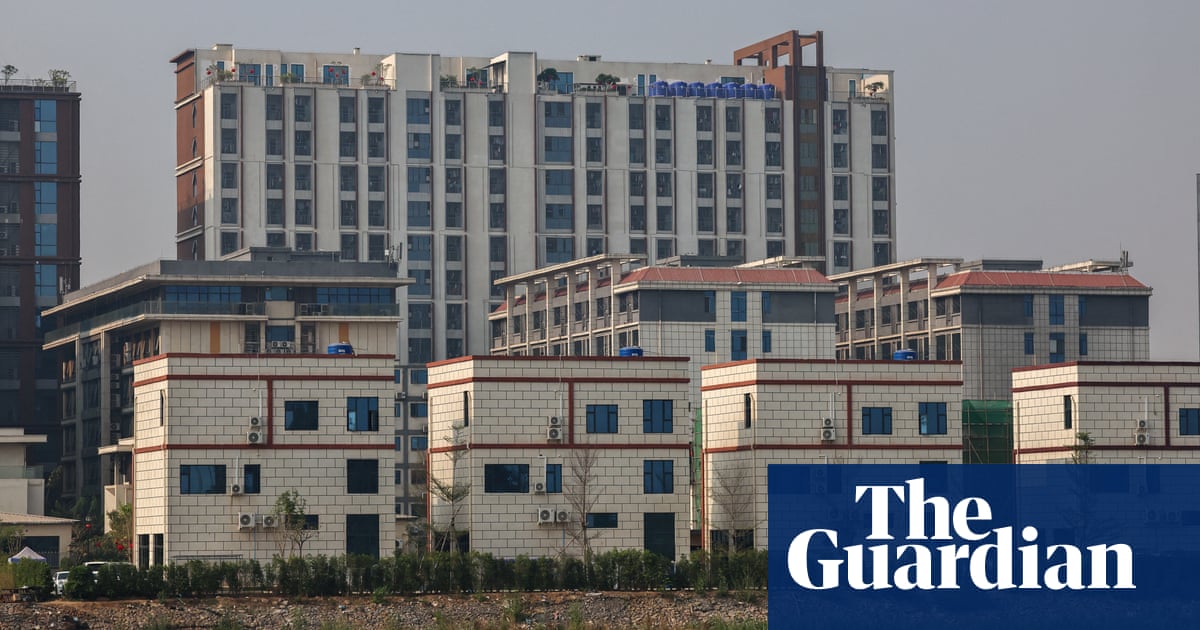Tens of thousands of people could be living inside illegal scam compounds in Myanmar that have proliferated near Thailand’s border, according to the head of Thailand’s anti-trafficking agency, who warned it could take months before all foreign nationals are repatriated.
Thailand has launched a major crackdown on scam compounds over recent weeks, cutting off cross-border electricity and fuel supplies.
Police General Thatchai Pitaneelaboot, director of the Anti-Human Trafficking Center, told the Guardian it is believed that between 30 and 40 Chinese criminal gangs were running the centres.
There could be more than 10,000 people inside such buildings, he said. “It could be 30,000, 50,000, maybe 100 [thousand],” he said. More than 30 nationalities have been identified among the workers, although many are from China.
Thailand shares a porous border with Myanmar, which has been gripped by civil war since 2021, and it is common for refugees fleeing conflict, as well as commuters, to cross. A lack of enforcement has also allowed criminals to go back and forth to building complexes that stand near the border.
On Thursday, double-decker coaches transported Chinese workers across the border. Four flights were due to take Chinese nationals home from Mae Sot on Thursday.
Last week, an armed group in Myanmar handed over 260 scam centre workers from a dozen countries, including the Philippines, Ethiopia, Brazil, Nepal and Thailand.
Thatchai said Thai officials would not collect the workers from inside Myanmar, but would instead meet them once they have been transferred to the Thai side.
The Karen Border Guard Force (BGF), a group allied with the Myanmar junta which controls areas where many scam centres are based, told AFP it would it will deport 10,000 people linked to compounds.
Hundreds of thousands of people have been trafficked into the region from across the world, according to the UN, often lured by the promise of a comfortable office job. Once they arrive, they are held against their will and forced to generate income by carrying out online scams, targeting victims globally. Research by the US Institute of Peace estimated these scams generate $63.9bn a year in global revenue, the vast majority of which ($39bn) is generated in Cambodia, Myanmar and Laos.
People recently released from the compounds have said they were beaten and electrified, showing media bruises and wounds.
Thatchai said such claims should be looked at carefully. “Some of them voluntarily go there and work, try to scam other people, get lots of money and go back,” he said, adding that in other cases people were forced into criminality and subjected to violence.
“Some syndicates use violence to control people… When you say ‘I don’t want to work here anymore’. But the syndicate has already invested in them [by paying for] the ticket for the transportation, for the cost of living.”
Foreign nationals will be transferred to Thailand over the coming weeks and months, where they will be screened to determine whether they are a victim of human trafficking or have willingly carried out scams. Chinese nationals, who make up a large proportion of the returnees, will be screened in China, Thatchai said.
Other workers are from countries including Ethiopia, Kenya, Indonesia, Malaysia and Vietnam, he said.
The recent crackdown follows the high profile disappearance of a Chinese actor Wang Xing, 22, who travelled to Thailand thinking he had a casting call with film producers, but was instead driven 500km to Mae Sot in western Thailand and trafficked over the border to work in a scam compound. His girlfriend, alarmed that she was no longer able to contact him, asked for help on social media and her post drew huge attention.
Wang was found in January more than a month after his abduction, returning with a shaved head. The case threw a spotlight on the issue of human trafficking in the region and caused anxiety in Thailand, which feared the incident would damage its reputation as a tourist destination for Chinese tourists, a crucial market.
On 4 February, Thailand cut power and internet to five locations inside Myanmar known to be hubs for scam syndicates in Myanmar, and placed restrictions on the sale of fuel.Thailand’s Provincial Electricity Authority has contracts to sell electricity to distributors in some areas of Myanmar.
Across the border from Shwe Kokko, one of the infamous scamming hubs, the sound of generators can be heard. Some compounds were still operating, said Thatchai. “But they don’t operate fully, at their capacity,” he added. Previously, they were a 24 hour operation, he said. “Because they [target victims] different parts of the world.”
China has shared names of thousands of Chinese nationals suspected of involvement in the syndicates, while China’s public security assistant minister Liu Zhongyi has visited both Bangkok and the border in recent weeks to arrange the repatriation.
The Chinese gangs linked to scam operations in Myanmar were also believed to be linked to similar operations in Cambodia, Thatchai said. Such criminal operations have spread in areas of the region where governance is weak.
The repatriation has placed a significant burden on Thailand, which faces the challenge of transporting and temporarily accommodating groups, said Thatchai. Some embassies have not yet committed to funding the repatriation of their nationals.
